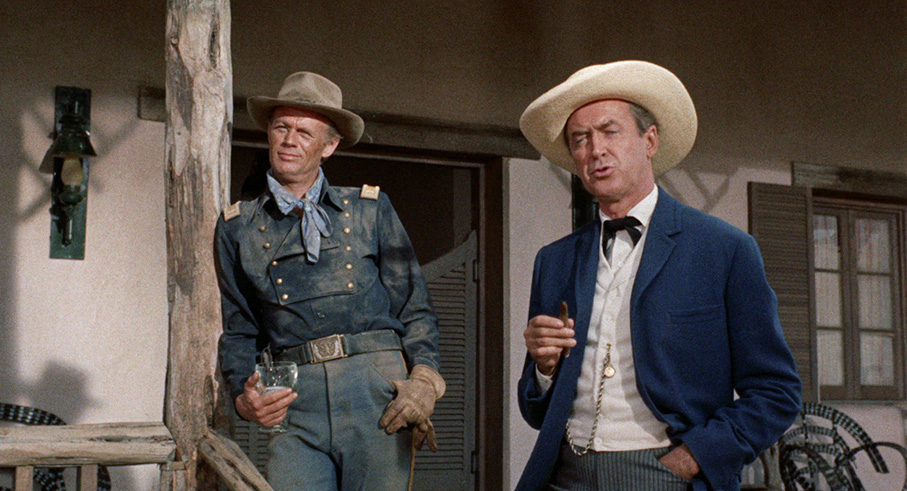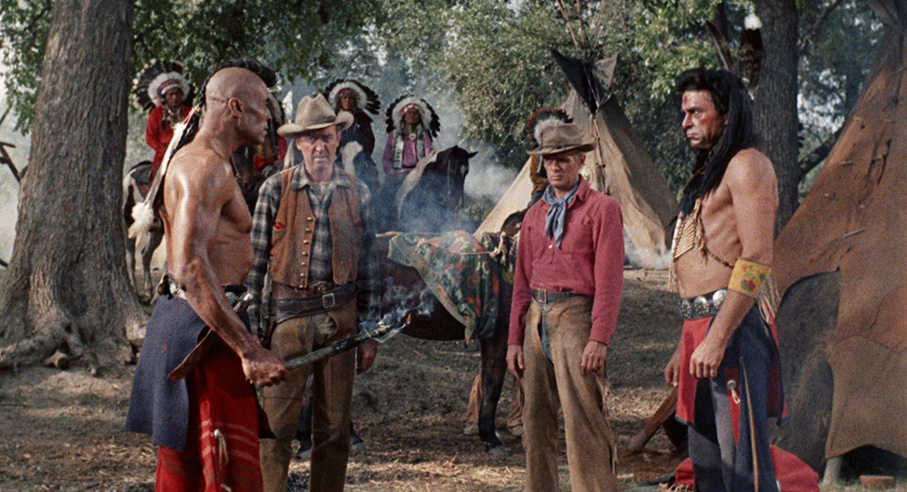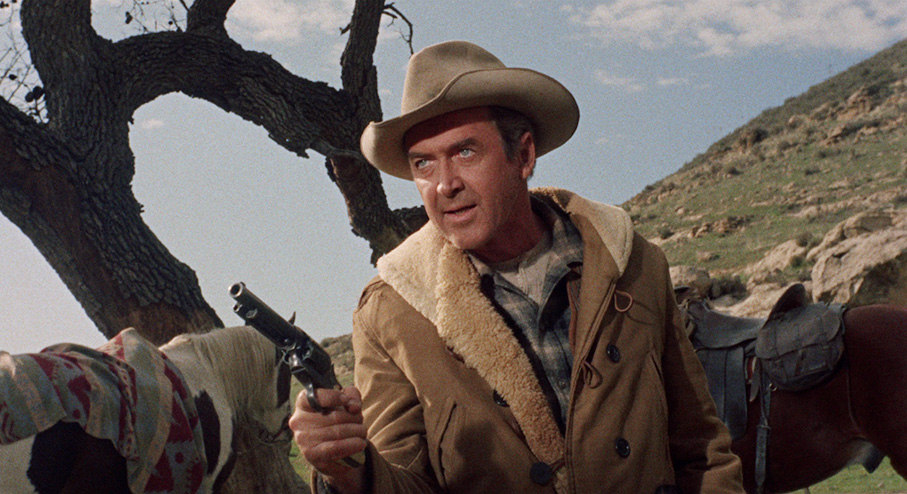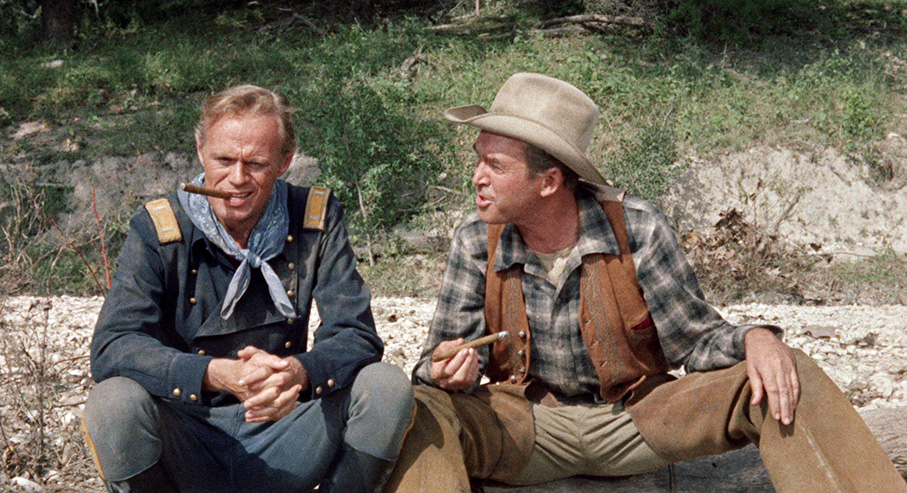|
When we first approach a western that was made by a director of some of the greatest ever westerns, we tend to do so with certain expectations. That certainly seems to be what happened to John Ford and his 1961 Two Rode Together, a film that tends to stand in the shadow not just of the other genre films that he made in the 1950s – which included Sergeant Rutledge, The Horse Soldiers and the magnificent The Searchers – but also the Ford film that immediately followed, the justifiably revered The Man Who Shot Liberty Valance. It's not too hard to see why, and ammunition for all the pot-shots you'd care to take is provided by the news that Ford apparently only did it for the money (his pay-cheque for this film was a substantial one for its day) and once described the film as, "the worst piece of crap I've done in twenty years." Ouch. But just because it's not a masterpiece doesn't mean that Two Rode Together isn't still a work of considerable interest, as much for its cast and its approach as for its place in Ford's oeuvre.
It certainly gets off to an entertaining start, as Marshal Guthrie McCabe (James Stewart) dozes on the porch of a saloon, feet up and tilted back in his chair in what just has to be a nod to a much-loved sequence in Ford's 1946 My Darling Clementine. He's woken by a church bell and the arrival of what we can assume is a specifically timed beer. When two beefy-looking, black-dressed and new-in-town gamblers walk up the saloon steps, McCabe suggests they grab a quick drink and be on their way. They're clearly not in the mood to do so, at least until McCabe tells them his name, at which point both men suddenly adopt a tone of humble politeness and sheepishly retreat. We don't know much about McCabe at this point but we can be sure of one thing – he clearly has a widely known reputation as a man that you really don't want to mess with.

Moments later a company of Calvalry soldiers rides into town, led by Lieutenant Jim Gary (Richard Widmark). McCabe and Gary are clearly old friends, and the banter between them that follows delivers the first of the film's two sizeable surprises, and it's not about the dialogue but the mode of its delivery. Dialogue in westerns tends to have a formal quality, as audibly scripted and performed as that of historical dramas and rarely naturalistic. As this has been a genre convention since the films themselves had soundtracks, this has never been an issue. Yet when Gary and McCabe start conversing here, almost nothing about their dialogue feels scripted or rehearsed – it's almost as if Ford had given them a few specific pointers and then encouraged them to improvise, a speculation that research suggests was actually the case. The result is a delight, as Stewart and Widmark bounce amusingly and argumentatively off each other in a manner that quickly and likeably defines their characters. A short while later this happens again, when the two sit down by a riverbank and entertainingly riff on everything from money and women to the task ahead in a single unbroken, four-minute two-shot. Ford claimed that he did this to avoid cutting back and forward between close-ups of "pock-marked faces," but the two actors have suggested that the decision was driven more by the director's sadistic desire to keep the camera crew half-submerged in icy river water for a good part of the day.
Anyway, back to the story. Gary, it turns out, has been sent to collect McCabe and escort him to Fort Grant at the behest of Major Fraser (John McIntire) – in irons if necessary – for reasons that he refuses to reveal. The reluctant McCabe eventually agrees to go along, largely to put some distance between himself and Belle Aragon (Annelle Hayes), the feisty owner of the hotel that McCabe has a ten per cent stake in and who has recently been hinting that the two partner up in more than just the business sense. When they reach Fort Grant, Major Fraser reveals that he is being pressured by the families camped outside the fort to rescue loved ones who have been kidnapped by the Comanche, and he believes McCabe is the best man for the job. McCabe is somewhat less enthusiastic, but agrees to take the job when it occurs to him that he can charge each of the families a bounty for retrieving their lost relatives. Herein lies the film's second surprise, that an actor who specialised in playing honourable and decent men would be cast as one who turns out to be a heartless, self-centred and mercenary scumbag. This is really brought home when the sweetly tomboyish Marty Purcell (Shirley Jones) hands the drunken McCabe a photo of her brother, who was snatched by the Comanche nine years ago at the age of eight, and McCabe is cruelly unsparing in his description of the sort of young man that the boy has likely become as a Comanche brave – "He'd rape you if he had the chance!" he barks imposingly at her, much to the protective Gary's disgust.

When McCabe departs on what turns out to be a trading mission, Gary is ordered by Fraser to accompany him and is required to travel as a civilian by a treaty that the army has with the Comanche forbidding military personnel from entering tribal settlements. Unfortunately for him, Comanche Chief Quanah Parker (Henry Brandon) instantly recognises Gary as an army officer, though it probably doesn't help that despite changing his jacket and hat, he's still wearing his distinctive army slacks. This proves to be the least of their problems. Of the three white captives they find in the camp, one elderly woman is too ashamed to return with them, another runs and hides at the mere mention of her birth name, the 17-year-old Running Wolf (David Kent) has been raised as a brave and is hostile to the prospect of being separated from his tribe, and Mexican woman Elena de la Madriaga (Linda Cristal) is now the wife of Stone Calf (Woody Strode), a renegade warrior who has no interest in surrendering his woman to this trade.
Probably the most frequently made complaint about Two Rode Together is that it recycles themes and elements from Ford's earlier The Searchers to considerably less effect, something Ford himself also saw as a problem when first offered the project. The similarities are certainly hard to ignore: both involve a quest to rescue kidnapped whites who have been kidnapped by the Comanche; both missions are led by a self-centred bigot with a fearsome reputation who is accompanied by a more level-headed companion; both see that bigotry softened by direct exposure to a kidnapped woman; and both use secondary characters for comic relief (one of whom is played by Ken Curtis, who served the same function in The Searchers). The Comanche chief is even played by the very same actor in both films. Tonally, however, these are very different movies. Here, there is none of the earlier film's stylistic beauty and carefully crafted compositions or the surrealistic horror of its farmhouse attack, and the sun-drenched vistas of Monument Valley have been traded in for largely featureless plains and glumly overcast skies. The action is also surprisingly low-key and matter-of-fact in execution – an ambush that McCabe sets up for a man who is earlier set up as a potentially formidable adversary is over in seconds, while a fight involving Gary and two would-be suitors for Marty's hand quickly dissolves into a scrappy brawl cheered on by the drunken McCabe.

Where Two Rode Together does stand apart from its predecessor is its later focus on the effect that of being torn from the world to which you have become accustomed and returned to one that the passing of time has rendered largely alien. For Running Wolf, who was kidnapped as child, his formative years have been spent with the Comanche, who now represent his family and the only way of life he can readily recall. For the older Elena, meanwhile, any hope of re-adjustment is scuppered by the judgemental prejudices of the community to which she has been returned. It's at this point that McCabe undergoes the moral turnaround experienced by Ethan Bishop in the climactic scene of The Searchers, as he becomes almost the sole supporter of Elena in a community that seems to have become infected with the bigotry that McCabe now angrily rails against. It's an intriguing and still socially relevant element of the film that takes a very dark turn for one of the characters and delivers an unexpected twist to McCabe's story when he heads back to home turf, one that suggests prejudice does not need modern accelerants like social media to spread like wildfire. There is, of course, a slightly uncomfortable irony in the fact that a film that takes a stand against prejudice hangs onto the concept of the ‘savage' Comanche, while its two principal Native American characters are played by white and African-American actors, though this was, of course, not unusual in genre films of the day.
Two Rode Together is not what you'd call an archetypal John Ford film, lacking as it does a number of the director's signature elements and the sheer poetry and balance of story, character and humour of the similarly themed and unquestionably superior The Searchers. That Ford was unhappy about even taking on the project does occasionally make itself felt, and enjoyable though James Stewart is as McCabe, he's overshadowed at almost every turn by John Wayne's iconic portrayal of Ethan Edwards in the earlier film. But there is nonetheless much to admire and enjoy here, in the delightful early improvisational exchanges between Stewart and Widmark, in how the casting of Stewart as McCabe intermittently turns his nice-guy image on its head, in the grim but still glumly relevant portrait of the insidious nature and poisonous effects of prejudice, and in dark places the film is prepared to take us in its later stages. I'm in agreement with those who do not consider Two Rode Together a great John Ford film and would be interested to read a well-argued claim to the contrary, but would also stand by those who regard it as an undervalued and too often dismissed work by one of the key figures of American western cinema.
So good have the previous HD transfers been of 50s and 60s westerns released on the Masters of Cinema label that I tend to approach every new title with perhaps unreasonably high expectations, but it's got to the point that disappointment is just not on the cards and the 1.85:1 1080p transfer of Two Road Together is up to Eureka's usual high standards. Sharpness and detail are always impressive, the contrast is very nicely balanced, with consistently solid black levels that do not suck in detail in darker areas, and the colour is pleasingly rendered, being naturalistic in daylight exteriors and not excessively tinted in warmer interiors or the cooler day-for-night scenes. The image is clean and free of damage, and there's no movement of the picture in frame. Very nice.

The Linear PCM 1.0 mono soundtrack is also in very good shape for its age, being clear and clean of any pops or background hiss.
There is also an optional Linear PCM 2.0 music and effects track for those who find dialogue distracting.
Rebirth – A New Visual Essay by Tag Gallagher (12:40)
An intriguing visual essay by the soft-voiced Tag Gallagher that explores the film from a number of interesting and often scholarly angles, breaking down the lead characters and their role in the narrative and discussing the claustrophobic nature of the scenery, Ford's growing disenchantment with the west, links to Truffaut's later L'enfant sauvage and a lot more.
Theatrical Trailer (3:08)
"The way it was, no holds barred, no words minced," we are assured in a solid enough trailer where John Ford's name is quoted as a badge of quality.
Booklet
The meat of this fine booklet is a thoughtful and impressively detailed essay on the film by critic and film writer Richard Combs, one that goes into enough depth to warrant a spoiler warning just below the by-line. This is illustrated with film stills and followed by a selection of international poster artwork. Credits for the film and the usual notes on viewing have also been included.
Not the mysteriously forgotten John Ford classic that I was perhaps hoping to discover, Two Rode Together is still an intriguing work whose most celebrated sequences are semi-improvised dialogue exchanges, and how many westerns could you say that about? The presentation, as ever with Masters of Cinema, is absolutely first class, and while the extra features are not great in number, it's their quality that ultimately counts. For genre fans in particular, recommended.
|